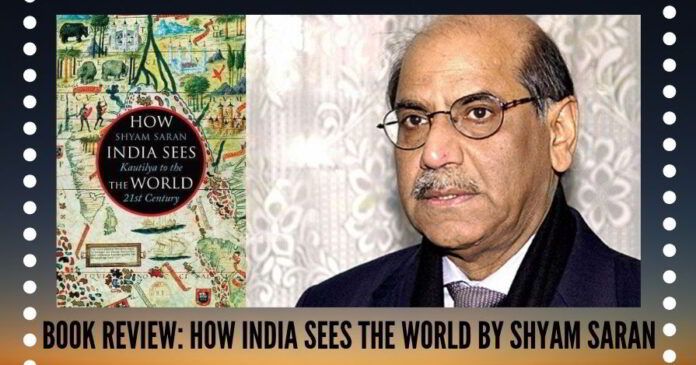
This book can be used as a temporal benchmark to differentiate between the ideal #NehruvianMindset of yesteryears and the purposeful #ModiDoctrine for the future.
India’s foreign policy and diplomacy have always reclined itself on moral considerations. Having read a few dated books on this topic, it comes as no surprise to decipher more about the old school underpinnings of India’s foreign policy establishment and the mind space in which it operates. Provenance is given weight over Payoffs, and Pontification over Purpose is the subtext of this book written by India’s former Foreign Secretary Shyam Saran.
I strongly believe India’s foreign policy, anchored on idealism, has failed India in the world order. It is a sad reality. The author is old school and will NOT fit into #ModiDoctrine is discernible.
This book is ascribed as a “part memoir and part thesis”. It betrays the sentiment miserably.
As a “part memoir” it is intellectually dishonest, and as a “part thesis” blatantly superficial. If that’s not enough, it was reviewed as “insightful” by one of India’s yet another “ace” diplomat. It is a shame.
In several instances, I felt the author has written the book as a detached observer, not as someone who played a part in advocating and advancing India’s foreign policy objectives during his tenure. Where’s the accountability?
#ModiDoctrine is based on assertiveness that was seriously lacking in yesteryears, so prescription from the old world thinking must be summarily dismissed in the modern context.
The book contains 3 parts:
Part 1 delves into sources of India’s world view and its policies from Independence leading up to the end of the cold war. If India’s foreign policy is based on principles enshrined in Arthashastra, as he quotes and references, why India has had historically failed relations with its neighbours? Given the historic failures of India’s foreign policy and the post-2014 direction, one wonders if there’s insinuation here.
The fact that India’s concept of South Asian “Compact” was interpreted as “Big brotherly” attitude by our neighbours resulting in disastrous consequences does not find acknowledgement at all.
There’s absolutely no “insights” on Nehruvian blunders – UN, China, and NAM. There’s no mention of ASEAN blunder either.
India’s foreign policy has been regarded as rigid, impractical and devoid of national interest by many domestic and international stakeholders. This part is proof of imbecile foreign policy and diplomacy in the early years of the Indian Republic.
Part 2 discusses our neighbours – Pakistan, China, and Nepal. Strange there’s no chapter on Srilanka. As usual, there’s this pontification on China before getting down to practical aspects of the relations. India’s security environment is fragile and there’s no acknowledgement of what could have been done better. There’s no ownership and accountability for India’s failed policies with any of our immediate neighbours. There’s superficial acceptance on Nepal but not in its entirety. How will one explain the election of a communist government in Nepal in 2006? He was at the helm during the time. He seems to conveniently blame the political leadership for the failures.
This part is a veritable proof of the ambivalent nature of India’s foreign policy and diplomacy.
Part 3 is primarily about his role in the Indo-US Nuclear Deal, the failed Copenhagen Climate Change and his thoughts on shaping the emerging world order. He highlights his role in the successful Indo-US Nuclear deal and the failed Climate change summit. The Nuclear deal and the NSG waiver is certainly something to be proud of for the Indians. The anecdotes are interesting, point to how the United States, under President George W Bush, went out of the way to secure the deal and the NSG waiver. The Indian contingent was surprised at the support rendered by President Bush himself for the Indo-US Nuclear Deal. This and the details on Copenhagen Climate Change marks for good reading.
There are many examples in the book that exposes the author’s Nehruvian mindset. If the author is averse to “nationalistic” drive in foreign policy, how will he justify the “strategic autonomy” that he advocates when both demand accommodation, collaboration and flexibility with partners and stakeholders?
Numerous references to non-alignment sadly point to the missed opportunities during the cold-war era. India’s indecisiveness has been called as “strategic restraint”, and one will find several occurrences of “strategic” gibberish throughout the book.
The author’s role in the Siachen proposal in 2006 (withdrawal of forces) comes as a rude shock. Thank goodness, if not for M K Narayanan, the then NSA, we may not have Siachen under our control today.
Shyam Saran is a victim of Indian foreign policy mindset – both political and diplomatic, during his time. To put it bluntly, he comes across as someone with historical baggage, unlike say Dr S Jaishankar, who is open-minded & known for out of the box thinking.
Shyam Saran’s prescription on the emerging world order and India’s role in it must be taken with a pinch of Salt.
Why?
#ModiDoctrine is based on assertiveness that was seriously lacking in yesteryears, so prescription from the old world thinking must be summarily dismissed in the modern context.
To wrap up,
- The book neatly ignores or camouflages several historic failures, seems to absolve the diplomacy of any wrongdoing and blame the political leadership!
- Indian foreign policy framework lacked support for outcome-oriented thinking is indubitable.
#ModiDoctrine inherited those damning qualities in 2014 and has been working overboard to turn things around. It is my fervent hope that newfound assertiveness (#Doklam and #Balakot are striking examples) will help India march along in the International order with poise and purpose in the years ahead.
In the larger scheme of things, this book can be used as a temporal benchmark to differentiate between the ideal #NehruvianMindset of yesteryears and the purposeful #ModiDoctrine for the future.
Note:
1. The views expressed here are those of the author and do not necessarily represent or reflect the views of PGurus.
- US Elections 2020: The Democratic dissonance - June 28, 2020
- Book Review: How India Sees The World by Shyam Saran - June 6, 2019
- Book Review: Menstruation Across Cultures, a historical perspective by Nithin Sridhar - May 13, 2019










